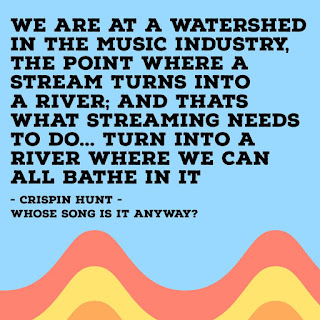The Digital, Culture, Media and Sport Committee is examining the impact of music streaming in the Economics of Music Streaming Inquiry. An overview of the inquiry was provided here, and my reflections on some of the issues here.
As part of my podcast series Whose Song is it Anyway? We interviewed Tom Gray, the founder of the #brokenrecord campaign, who talked about how the campaign started, the motivation and goals of the movement, and how that led to him and other's giving evidence at the Streaming Inquiry. The episode will be published on Monday 25th January on all podcast platforms and YouTube.
Today was the latest oral evidence session where MPs asked the top record labels - Sony, Warner and Universal - about the benefit to market-dominant labels from the production and licensing of streamed music, and the underlying issues which have led to calls for a review of the distribution of streaming revenues in a more equitable way.
Session 1: The collecting societies
 |
| Quote from Episode 1 of podcast: Whose Song is it Anyway? |
Andrea Martin focused on pushing the need to replicate Article 17 of the Copyright Digital Single Market Directive to remove the safe harbour protection for YouTube, in UK law - since we are not transposing this Directive having left the EU.
Session 2: The record labels
Things really heated up in the second session when MPs grilled Tony Harlow, Chief Executive at Warner Music UK; Jason Iley, Chairman and Chief Executive at Sony Music UK & Ireland and David Joseph, Chairman and Chief Executive at Universal Music UK & Ireland.
What is a stream?
The labels were asked to consider what a stream is, in terms of its copyright distribution - is it a rental or a sale? The reason that this is such an important question is because rental already carries equitable remuneration. The labels treat streams as sales, which do not.
The label executives squirmed and avoided directly answering many of the questions. Leading to Julian Knight giving them a right telling off.
Q: Is a stream a licence or sale?!
Jason Iley (SonyUK): "It's a subscription model."
Q: Okay. Do you pay your artists AS IF it was a sale?!
Jason: .... repeats something about subscription models.
Tony Harlow, from Warner, took the view that a stream is a sale, or the internet equivalent of a sale, because it is a deliberate choice made by the listener, as opposed to radio which is passive listening. Of course, MPs raised the counter-point that much of streaming is passive, due to looping and playlists etc.
David Joseph, of Universal, stated that: "It’s really important that it’s not radio,” citing fan curiosity... Although earlier on in the day we heard from PPL that they do licence online radio, including that they are currently in negotation with Apple Music to collect equitable remuneration for Apple Music Radio, so it is not an issue of technology.
Kevin Brennan MP suggested: "Isn't it a hybrid?" Stating that as a result, UK copyright law is not fit for purpose, since it cannot accurately apply in these circumstances.
Some of the questions from MPs in this session demonstrated their concern for the compelling evidence provided by the artists, citing Nadine Shah and picking up on specific points raised in the previous sessions. There was a suggestion that the next people to face questions will be the streaming services.
Although we cannot say what will happen at this stage, it does seem that the committee is sympathetic to the artists' complaints. And, after the performance from the executives today, particularly their resistance against answering the questions, less than impressed with the record labels. Closing the session, Julian Knight MP remarked that "“I think the performance today has been a bit more Hufflepuff…”
Overall, the impression so far is that the current streaming landscape does not fairly remunerate musicians and artists, and copyright law may very well be updated to accurately reflect the nature of a stream to try to remedy this.
The recording of the meeting can be found here.
 Reviewed by Hayleigh Bosher
on
Tuesday, January 19, 2021
Rating:
Reviewed by Hayleigh Bosher
on
Tuesday, January 19, 2021
Rating:




![[GuestPost] G1/24: Tuning in! A take on the state of proceedings before oral proceedings](https://blogger.googleusercontent.com/img/b/R29vZ2xl/AVvXsEjZhEivE5bp7QOwZsyZXAXbVNYSmLjUthkB2Q7fm1_dpB97u5lIQeyWT9ZadUTAH3Z-hXn13VpW4vBDRPx9emCnoDV6tbUTkyvfmqPv1nNInL8XMdrAtSZ2hcRQr2LjxKovC9wTk_XyZxQ0CtX1MUrO_Muz3OJ4ld8AftymsdUmKD7xNksYMwk6/s150/Picture%201.png)


![[Guest book review] The Handbook of Fashion Law (with a discount code)](https://blogger.googleusercontent.com/img/b/R29vZ2xl/AVvXsEgB4h2AdqJKwq9O3Ft4Mb7C39tv_NeFpkzrOfvhIsuwAkM_ops2Hgj7fdwzq_TQsjQDvQrQa-yyC9Q9pNiugseXRlUaMdsr_cmYUbh9lH8HDECMCbsTuNboVgpafyEhkgDkVS6ruHkuz8Sx0QVGI_1S8R9kbsHdNIYrRjqhyphenhyphen010_txjJUYvlZOtWA/s150/Fashion%20Law%20Book%20Bicture.jpg)








No comments:
All comments must be moderated by a member of the IPKat team before they appear on the blog. Comments will not be allowed if the contravene the IPKat policy that readers' comments should not be obscene or defamatory; they should not consist of ad hominem attacks on members of the blog team or other comment-posters and they should make a constructive contribution to the discussion of the post on which they purport to comment.
It is also the IPKat policy that comments should not be made completely anonymously, and users should use a consistent name or pseudonym (which should not itself be defamatory or obscene, or that of another real person), either in the "identity" field, or at the beginning of the comment. Current practice is to, however, allow a limited number of comments that contravene this policy, provided that the comment has a high degree of relevance and the comment chain does not become too difficult to follow.
Learn more here: http://ipkitten.blogspot.com/p/want-to-complain.html